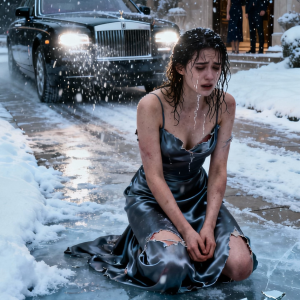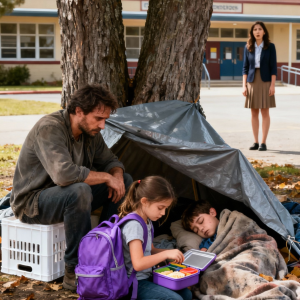
The midnight-blue sedan glided silently into the long driveway of the Hawthorne estate in upstate New York, arriving hours before anyone expected. Julian Hawthorne, a billionaire who controlled every aspect of his life, had returned from London without informing his staff or even his eleven-year-old son Oliver. For weeks, he had sensed whispers among the household staff and an unusual quietness in the mansion. Most of all, he feared the growing distance between himself and his only child.
Oliver, confined to a wheelchair since a car accident had taken his mother two years ago, had withdrawn into himself. Julian had spared no expense, hiring the finest tutors, therapists, and specialists and filling their home with the latest medical equipment. Yet nothing seemed to reach the boy’s heart.
Julian unlocked the door with his silver key and stepped into the dimly lit hall. The silence pressed against him like a weight. His polished shoes echoed across the marble floor as he loosened his tie, heart pounding with unease. Then he heard it.
Laughter spilled from the living room. Pure, unrestrained, and full of life. Julian froze, caught off guard by the sound. It was the kind of laughter he had not heard from his son since before the accident.
He crept forward and paused at the doorway. On the Persian rug a girl with messy auburn hair and a faded green dress crawled on all fours. Oliver sat astride her back, holding her shoulders as he roared with joy. His wheelchair had been pushed aside and forgotten.
“Faster, Mara, faster!” Oliver shouted, cheeks glowing with excitement.
Julian felt a rush of anger and shame. His son was riding the daughter of a maid like she was a toy, and worse, he looked happier than he had in years.
“What is the meaning of this?” he demanded, his voice booming.
The children froze. Mara helped Oliver slide down gently, her wide eyes full of fear. “I-I’m sorry, sir,” she whispered. “We were only playing.”
“Playing?” Julian said bitterly. “This is my home, not a playground. You are the daughter of a servant and you do not belong here.”
Oliver’s smile vanished. “But Father—”
“Silence!” Julian interrupted sharply. “You will never touch my son like this again.”
Then something extraordinary happened. Oliver gritted his teeth, grasped the edge of the sofa, and pushed himself upright. Trembling yet determined, he shouted, “Stop it, Father! Stop being cruel to her! She is my friend!”
Julian could hardly believe his eyes. His usually timid son had spoken with fire and defiance.

“She is the only one who treats me like I am not fragile,” Oliver said, voice cracking. “Everyone else looks at me and only sees what I cannot do. Mara sees who I am!”
Julian’s chest tightened. Had he truly been blind to his son’s loneliness, seeing only his limitations instead of his heart?
Mara stepped forward, still trembling but resolute. “He is not broken, sir,” she said softly. “He just needs someone to believe in him. I believe in him.”
Before Julian could reply, Mara’s mother Elena appeared at the doorway, flour dusting her apron. Her eyes widened at the scene. “Sir, please forgive her,” she pleaded. “She will not trouble Master Oliver again.”
“No!” Oliver cried, tears streaming down his face. “If Mara has to go, I will leave too. I do not care about this house or your fortune. I just want a friend!”
Julian felt the weight of his son’s words like a hammer. All the wealth and protection he had provided meant nothing compared to the simple companionship of a friend.
Mara wiped her eyes and spoke gently. “He is brave and kind. He tells me stories, he helps me learn, and he makes me laugh. Isn’t that what matters?”
Elena tried to pull her daughter back, but Julian raised a hand and stopped her. For the first time, he truly looked at Mara, not as a servant’s child, but as the girl who had returned his son’s laughter.
“You have given him something I forgot how to give,” Julian said quietly. “You have given him back his joy.”
Oliver’s face lit with hope. “So Mara can stay?” he asked.
Julian nodded, swallowing his pride. “Yes,” he said, “but on one condition. You must allow me to join your games sometimes. I have forgotten how to play, and perhaps you two can teach me.”
For the first time in years, Julian laughed freely. Oliver hugged him tightly. “Really, Father? You will play with us?”
“Really,” Julian whispered. “I want to live with you, not just protect you. I want to see the world through your eyes again.”
As the sun set over the Hawthorne estate, painting the room in warm amber light, Julian realized that no fortune could replace this. Laughter, love, and the courage to let a child simply be free were worth more than all the riches in the world.


